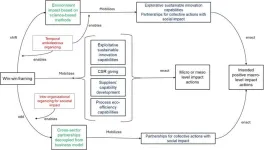(Press-News.org)
JP Singh, Distinguished University Professor, Schar School of Policy and Government, received funding for: “George Mason University Center for AI Innovation for Economic Competitiveness.” He is collaborating on the project with Co-Principal Investigator Amarda Shehu, Associate Vice President of Research, Institute for Digital Innovation, Professor, Computer Science, College of Engineering and Computing (CEC); Jesse Kirkpatrick, Research Associate Professor, Philosophy, College of Humanities and Social Sciences; Acting Director, Institute for Philosophy and Public Policy, Philosophy and Religious Studies; Terry Clower, Northern Virginia Chair in Local Government; Professor of Public Policy, Schar School of Policy and Government, Director, Center for Regional Analysis; and Naoru Koizumi, Professor of Public Policy; Associate Dean of Research and Grants, Schar School of Policy and Government.
In a groundbreaking move set to bolster the economic competitiveness of small and medium enterprises (SMEs) across Virginia, George Mason has been awarded a $1 million grant to establish the nation’s first Center for Artificial Intelligence (AI) Innovation for Economic Competitiveness (CAIIEC). This pioneering initiative aims to place Virginia at the forefront of artificial intelligence adoption among SMEs, which often fly under the radar in discussions dominated by federal and big-tech AI advancements. The $1 million grant was sponsored by U.S. senators from Virginia, Mark Warner and Tim Kaine, and is directed through the U.S. Small Business Administration.
With this funding, George Mason officials will establish the first-in-the-nation Center for AI Innovation for Economic Competitiveness.
In close collaboration with the business community and George Mason’s Innovation and Economic Development Office, the Center will: a) develop a For-Virginia AI Strategy; (b) track Virginia’s business AI adoption rate; (c) offer programs to small- and medium-size enterprises (SMEs) to understand, capitalize, and innovate on emerging and disruptive AI, such as ChatGPT and other generative AI technologies; and (d) expand the talent pipeline through employee training, reskilling and upskilling in AI technologies, with a particular focus on underserved communities.
The Center will accomplish the following outcomes:
1. Needs Assessment: Through surveys and focus groups, researchers will identify ready opportunities for deploying AI across small business value chains in data gathering, chatbot-assisted voice automation systems, logistics support, precision manufacturing, service delivery, customer support, and demand forecasting;
2. SME Toolkits and Training: Create and deploy toolkits and training workshop modules to develop business plans for adopting AI, including engineering and business aspects;
3. Evaluation: Deliver state-of-the-art evaluation of AI adoption business practices and effectiveness; and
4. Expand the Talent Pipeline: Develop modular employee training content to upskill and reskill the workforce in AI technologies, directly support SME talent acquisition, and build AI workforce capacity that focuses on equitable opportunity for all of Virginia.
Singh received $1,000,000 from the U.S. Small Business Administration for this award. Funding began in Aug. 2024 and will end in late July 2027.
###
ABOUT GEORGE MASON UNIVERSITY
George Mason University is Virginia’s largest public research university. Located near Washington, D.C., Mason enrolls more than 40,000 students from 130 countries and all 50 states. Mason has grown rapidly over the past half-century and is recognized for its innovation and entrepreneurship, remarkable diversity, and commitment to accessibility. In 2023, the university launched Mason Now: Power the Possible, a one-billion-dollar comprehensive campaign to support student success, research, innovation, community, and stewardship. Learn more at gmu.edu.
END
Methane is a potent greenhouse gas frequently produced in the sea and in fresh water. Lakes in particular release large quantities of this climate-killer. Fortunately, however, there are microorganisms that counteract this: They are able to utilize methane to grow and generate energy, thus preventing it from being released into the atmosphere. These microorganisms, known as methanotrophs, are therefore regarded as an important "biological methane filter".
Methanotrophs comprise various groups of microorganisms, and many questions about their way of life have yet to be answered. A study by researchers from the Max Planck Institute for ...
(Santa Barbara, Calif.) — In work conducted both at UC Santa Barbara and the Physics of Life Excellence Cluster of TU Dresden, biophysicist Otger Campàs and his research group have found that cell nuclei control the architecture and mechanics of eye and brain tissues during embryonic development. These results add a new role for the cell’s nucleus in tissue organization, well beyond its established role in genetic regulation.
“We were measuring tissue stiffness in the zebrafish retina, and realized that it depended on the packing of nuclei. This was totally unexpected because tissue mechanics is believed to depend on cell surface interactions, but not ...
TUCSON, Arizona — Researchers at the University of Arizona Mel and Enid Zuckerman College of Public Health and the U of A Native Nations Institute are establishing a framework that protects the way Indigenous data is collected and used around the world, thanks to a $1.5 million grant from the National Science Foundation.
For as long as researchers, health care providers and government agencies have studied Indigenous communities, there has been mistrust about the data collected. Indigenous peoples have raised concerns about who owns and profits from the data, as well as how it is used. Using the grant, the researchers, in ...
EPFL researchers have published a programmable framework that overcomes a key computational bottleneck of optics-based artificial intelligence systems. In a series of image classification experiments, they used scattered light from a low-power laser to perform accurate, scalable computations using a fraction of the energy of electronics.
As digital artificial intelligence systems grow in size and impact, so does the energy required to train and deploy them – not to mention the associated carbon emissions. Recent research suggests that if current AI server production continues at its current pace, their annual energy consumption could outstrip that of ...
Amsterdam, August 12, 2024 – An article in a special issue on The Planetary Future published in Environmental Policy and Law (EPL) by IOS Press (now part of Sage), considers the Planetary Trust as an essential framework underlying today’s kaleidoscopic world, reviews important developments in implementing the Trust, and focuses on important steps to take now to ensure a just, robust Earth system for present and future generations.
Bharat H. Desai, PhD, Jawaharlal Nehru University, Centre for International Legal Studies, and Editor-in-Chief ...
Transforming Sustainability Strategies: Ecuadorian Corporations Leading the Way
The Bigger Picture: Shifting from Micro to Macro Impacts
The research redefines sustainability by examining how strategic framing can elevate corporate actions to achieve significant macro-level impacts. Moving beyond individual and community-focused efforts, the study highlights broad-scale changes that enhance societal and environmental well-being, including nationwide poverty reduction, environmental improvements, and public health advancements.
Corporations ...
About The Study: There were similar and, in some instances, more favorable neonatal and maternal outcomes for pregnancies exposed to buprenorphine combined with naloxone compared with buprenorphine alone. For the outcomes assessed, compared with buprenorphine alone, buprenorphine with naloxone during pregnancy appears to be a safe treatment option. This supports the view that both formulations are reasonable options for the treatment of opioid use disorder in pregnancy, affirming flexibility in collaborative treatment decision-making.
Corresponding ...
Our brain interprets visual information by combining what we see with what we already know. A study published in the journal Neuron by researchers at the Champalimaud Foundation, and supported by the CaixaResearch Health Call of the la Caixa Foundation, reveals a mechanism for learning and storing this existing knowledge about the world. They found that neurons are wired to connect seemingly unrelated concepts. This wiring may be crucial for enhancing the brain’s ability to predict what we see based on past experiences, and bring us a step closer to understanding how this process goes awry ...
More than 47,000 people died in Europe as a result of high temperatures in 2023, the warmest year on record globally and the second warmest in Europe. This is the estimate of a study led by the Barcelona Institute for Global Health (ISGlobal), a centre supported by the "la Caixa" Foundation, and published in Nature Medicine. The researchers report that the vulnerability to heat of European societies has progressively decreased over the present century, and estimate that without these societal adaptation processes, the heat related mortality burden over the past year would have been 80% higher.
The study replicates the methodology used last year in another paper ...
About The Study: Child tablet use at age 3.5 years was associated with more expressions of anger and frustration by the age of 4.5 years in this study. Child proneness to anger/frustration at age 4.5 years was then associated with more use of tablets by age 5.5 years. These results suggest that early-childhood tablet use may contribute to a cycle that is deleterious for emotional regulation.
Corresponding Author: To contact the corresponding author, Caroline Fitzpatrick, PhD, email caroline.fitzpatrick@usherbrooke.ca.
To access the embargoed ...





